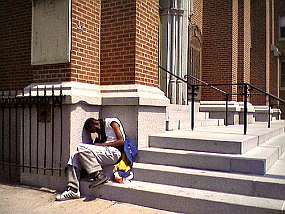Sometimes, you find yourself in the middle of a ghetto.
I have a friend who—God bless him—has given most of his life to minister to the inner city poor. Too long ago, he and I would occasionally, late at night, walk the streets of his new neighborhood to talk with people.
As two terminally white, bearded guys over 6′ 4″, we sorta stuck out. Because this was the “ghetto.” And all the stereotypes were in play.
Except they weren’t.
On one particular walk, my friend abruptly pulled up and turned around. When I asked why, he surprised me with his answer. “Down that street is Appalachian territory,” he whispered and motioned. “No one goes in there.”
Different ghetto, different hostility.
Ghetto is a word in transition. In the past, it simply meant a part of a city that was dominated by one ethnic group or one way of living. Harlem in New York City always comes to mind, but one could easily argue that Wall Street is its own ghetto, albeit a wealthy one. In the case of the word ghetto, over time, a poverty aspect crept into the meaning, but it hasn’t always been there.
In Christianity, we have built our own ghettos. We call them denominations. Or we add theological labels such as Reformed, Charismatic, Arminian, or Anabaptist. Because labels. Can’t be a good Christian without ’em, right?
Whatever our slant on our Christian ghettos, the same etymological transition is at work: a slide into poverty.
Except in the Christian case, the poverty is in the diversity of ideas. Or on the exclusionary focuses of the faith. Eventually, everyone within that ghetto winds up poorer theologically and relationally. In most cases, they don’t even see it happening.
I see in the modern American Church an increasing tendency to stop at the end of the sidewalk and say, “No one goes in there.” Whoever or whatever lurks there, we’re too afraid to deal with him/her/it.
One of the most insidious examples of this occurs in certain Christian communities often seen online. You probably know them. Certain individuals within a certain group run certain websites that espouse certain theologies. When one of those individuals writes a book, others within that group write the glowing reviews and recommendations. After a while, you see all the same names recommending each other’s books and sites and dissing every book, site, or individual that comes from outside that certain group.
I believe such incestuous, prejudiced thinking and doing borders on dangerous. It creates its own form of unteachability, an imperviousness to greater growth. People trapped within that ghetto never hear any different ideas. If anything, foreign ideas are rejected out of hand. It becomes scary group-think. And naturally, over time, poverty sets in.
Jesus said that we must become like children to enter the Kingdom. Perhaps a children’s book can teach us something about ghettos.
In Charlie and the Chocolate Factory, our kind, gentle, young hero gains admittance to a strange, off-limits ghetto: Willy Wonka’s candy plant. Once inside, Charlie finds the factory’s owner to be absolutely unhinged and perhaps even dangerous. The secluded factory bursts with nonsensical devices a rational person cannot envision. The invitees meet a bizarre tribe that lives in the factory. The tour participants witness things the ordinary person cannot understand and would likely reject for their oddity.
The problem with this and for everyone in the novel: As strange and scary as he and his factory are, Willy Wonka makes the world’s best candy.
 At the story’s conclusion, Wonka gives his factory to Charlie. And it’s not simply because the boy is the last one standing on the tour but because of Charlie’s humble, gentle, others-centered spirit. Wonka realizes the boy has something he lacks. In the same way, Charlie not only inherits the candy plant, but he also must realize that to continue to make it great, it must retain its weirdness, and he must move beyond being just a destitute, simple boy to embrace some of Wonka’s madness. For the world to become a more wonderful place, both Wonka and Charlie must break out of their ghettos.
At the story’s conclusion, Wonka gives his factory to Charlie. And it’s not simply because the boy is the last one standing on the tour but because of Charlie’s humble, gentle, others-centered spirit. Wonka realizes the boy has something he lacks. In the same way, Charlie not only inherits the candy plant, but he also must realize that to continue to make it great, it must retain its weirdness, and he must move beyond being just a destitute, simple boy to embrace some of Wonka’s madness. For the world to become a more wonderful place, both Wonka and Charlie must break out of their ghettos.
Like the Wonka factory, the Christian world has locations within it where too few go and thus never discover a place of genuine, if unusual, excellence. We are impoverished for our trepidation, for our clinging to our own ghetto, for being unwilling to see and explore. Our fear prevents us from becoming all that God would make us.
I think of the foreign-to-the-West thinking of Asian Christian Watchman Nee, who brings a unique Chinese perspective to the Church. Some would warn you not to read him, if only because he doesn’t read like your typical white theologian of any “respectable” bent.
Or Rod Dreher, who writes about ideas that seem liberal but are actually hallmark conservative, and from an Orthodox tradition.
Plenty of other ghetto-breakers exist.
I offer this:
If you’re a Nazarene, read a book by a Pentecostal.
If you’re Reformed, hang out at a few Wesleyan websites—and not just to slam people.
If you’re a Presbyterian, consider what the Medieval mystics wrote about union with Christ.
If you’re a white, American Christian, discover what black, African Christians think about the Faith.
Consider the possibility that everything you know comes solely from your ghetto—and that the Christian world is a much, much bigger place than you realize.
Weird and unfamiliar don’t automatically equal wrong. Sometimes, they form the sidewalk that takes you and me out of our comfortable ghetto to a place filled with utterly foreign wonders.
Sure, quicksand or tigers may lurk down that path, but you’re an adult. Be discerning. Test everything all the time.The presence of threats doesn’t negate what wonders might be discovered. If anything, wonders look threatening to the inexperienced.
Whatever your Christian ghetto might be, break out of it! You’ll be surprised what you might learn about yourself and about the Lord from someone who doesn’t look or think like you.

 Or the folks who go on and on about reaching the lost or ministering to the poor, yet who wish the Mexicans would go back where they came from. The disconnect is head-scratching.
Or the folks who go on and on about reaching the lost or ministering to the poor, yet who wish the Mexicans would go back where they came from. The disconnect is head-scratching. I was talking with friends this weekend about a minor split that occurred in their predominantly upper-middle class church. Several families, unhappy with the idea that the church was looking into broadening their outreach to some less advantaged areas, took their ball and went home. Or should I say that in a more appropriate vernacular: They started another church.
I was talking with friends this weekend about a minor split that occurred in their predominantly upper-middle class church. Several families, unhappy with the idea that the church was looking into broadening their outreach to some less advantaged areas, took their ball and went home. Or should I say that in a more appropriate vernacular: They started another church.